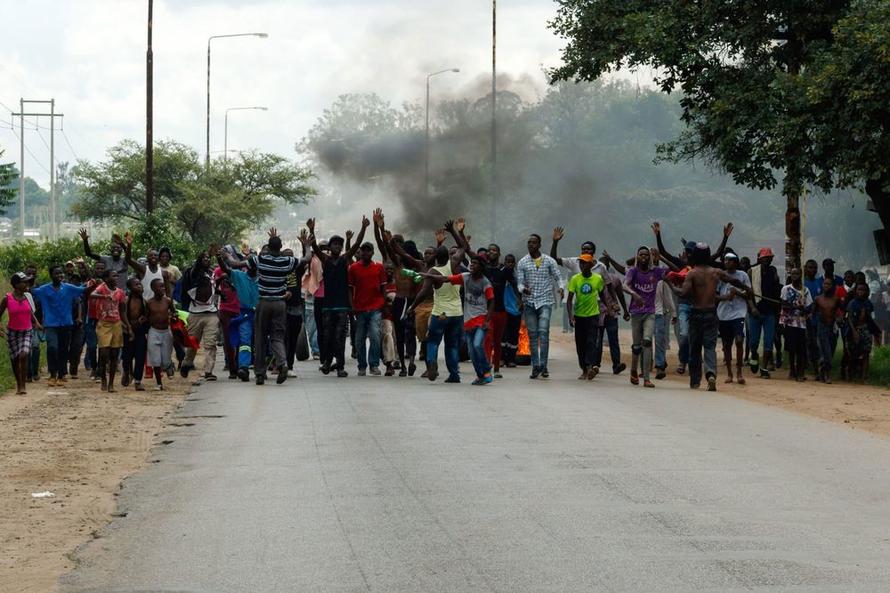"It Feels Apocalyptic" - A Letter From Zimbabwe, Where The Country Remains In Total Shutdown
20 January, 2019
Zimbabwe is once again at the brink of economic collapse, making a mockery of President Emmerson Mnangagwa’s claim that the country is open for business.
As Bloomberg reports, many shops and factories have shut their doors because of a lack of customers and those that continue to trade are open to haggling over prices to secure hard currency. At an appliance shop in the capital, Harare, a salesman whispers that a Whirlpool Corp. washing machine priced at about $5,000 if paid for electronically will sell for $1,500 in cash, while at a nearby electrical warehouse, a $600 invoice is whittled down to $145 for payment in dollar bills.
But, as OilPrice.com's Tsvetana Paraskova reports, Zimbabwe is on a three-day nationwide strike and protests are erupting in the streets after the government of the southern African country doubled fuel prices, making gasoline sold in Zimbabwe the most expensive gasoline in the world.
We are now in our third day of complete shutdown throughout the whole of Zimbabwe.
Banks are closed, schools are closed, roads are closed in and out of the main towns and transport systems have shut down.
There are no newspapers to be bought, the Internet has been shut down by the government and everything is at a complete standstill.
People are too afraid to move around as a result of the burning of vehicles by vigilante groups and the complete dearth of any updated information or warnings due to the total social media blackout. This means that no WhatsApp messages or photos can be sent, no one can access Facebook or Messenger, and the situation is very tense.
In some centres it almost feels apocalyptic. We have heard gunfire, and before the Internet was closed down, saw pictures of dead and wounded people.
It is unclear how many people have died but before the media blackout, it was reported that there had been five deaths and more than 200 people had been arbitrarily arrested.
Elements of the police and military are also involved in ensuring that there is a complete shutdown. People in civilian dress armed with AK-47 rifles have been seen in some areas. It is clear that these are military personnel.
Amnesty International has condemned the military crackdown and has called on the Zimbabwean authorities to ensure restraint by security forces and respect the public’s right to protest.
Zimbabwe Lawyers for Human Rights reported prior to the blackout that they had received reports of soldiers and police breaking into homes in townships overnight and assaulting suspected demonstrators.
Contacts in the diplomatic corps and the political opposition are also completely in the dark, along with the rest of us.
This morning I spoke to Nelson Chamisa, leader of the opposition Movement for Democratic Change (MDC) Alliance, and it is clear that no one knows what is going on because the entire country has been effectively silenced.
I have also spoken to lawyers regarding the arrest once again of Pastor Evan Mawarire who inadvertently triggered the highly successful #ThisFlag social media protest action in April 2016 because he could no longer afford to pay school fees. This led to his arrest on trumped up charges and his high profile court case. Since then, his activities have been under constant surveillance.
Police officers arrive at his flat this morning in central Harare and took him to the Law and Order section, charging him under a false charge of incitement to commit public violence.
The crisis was precipitated on Sunday (January 13) by President Emmerson Mnangagwa when he announced a shock increase of 200 percent in the fuel price – this in a country with more than 90 percent unemployment and where the struggle to survive escalates daily. Mr Mnangagwa promptly left the country for Russia and has not returned. Reports say that he has gone there to “discuss Russian assistance to modernise the military”.
Right now the situation remains eerie and uncertain. If this goes on for much longer, the humanitarian crisis will escalate. We cannot buy food because the shops are all closed and transport systems have closed down. Most of the hospitals are without essential medicines and also staff because doctors and nurses can’t even get to work.
This is an unprecedented situation in Zimbabwe and internationally. Even in wartime Europe, the people could get newspapers, transport systems operated, retail outlets were still open and people could communicate.
I cannot send you an e-mail or a photograph – it is a very weird situation.
The only thing we can do at this point is to ask for your prayers as we face this time of escalating fear and uncertainty.
Ben Freeth
Executive Director
Mike Campbell Foundation
Harare, Zimbabwe




No comments:
Post a Comment
Note: only a member of this blog may post a comment.